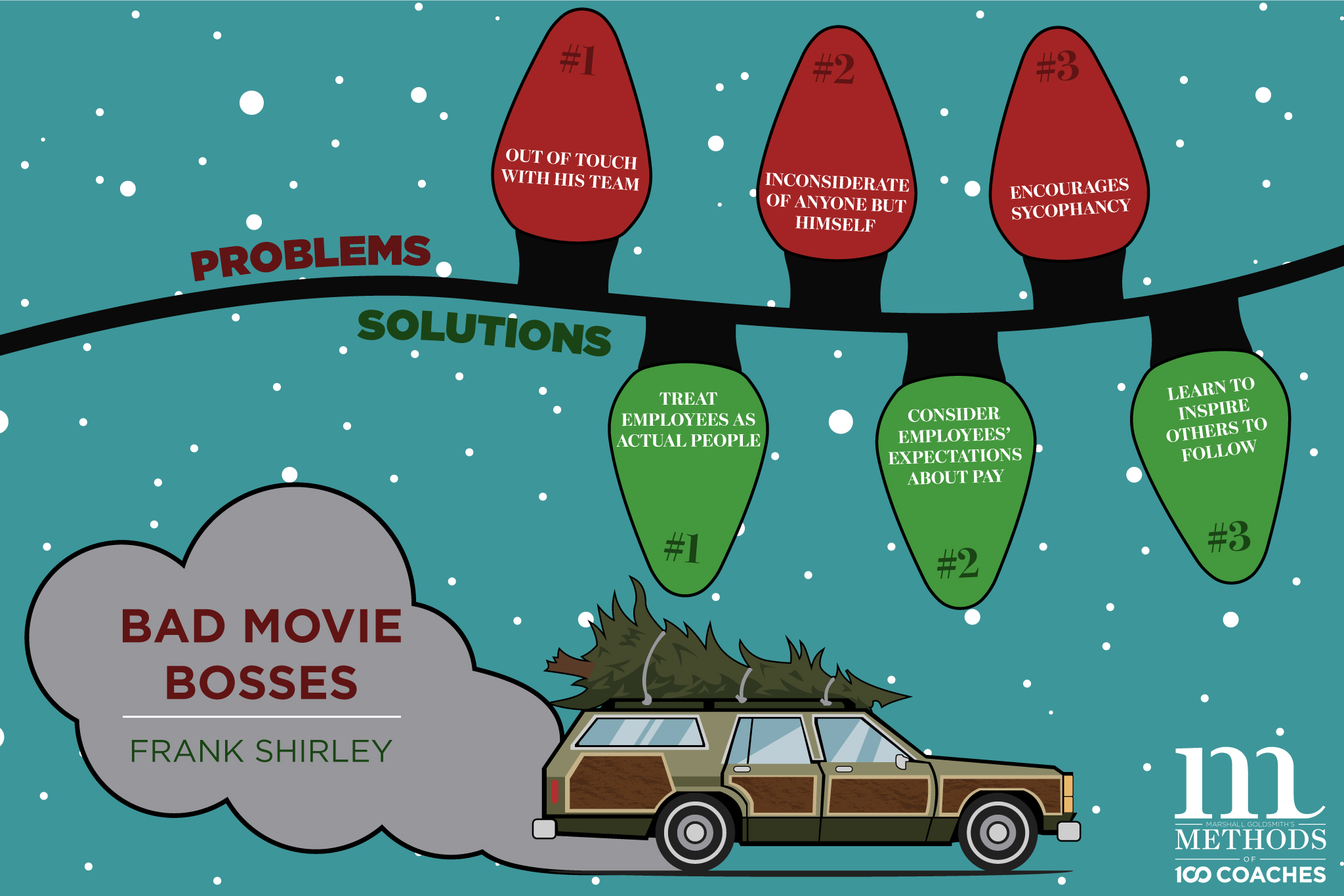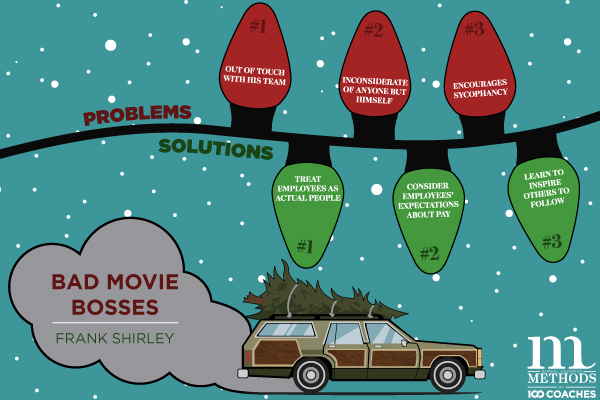Movies and TV have given us no shortage of portraits of people we’d rather not encounter in real life — just think of all the nefarious villains and unscrupulous anti-heroes that have graced the screen. If you saw Thanos or Gordon Gekko on the street, you’d run the other way screaming. We can look at these things from a distance and recoil with horror, or laugh at the absurdity of them, but we do it with the knowledge that we’re safe from having to deal with these people in our day to day. But what about those times when the screen all too closely resembles our reality? That’s when things get interesting. Throughout the history of the screen, this seems to happen with one particular archetype — that of the bad boss.

From Billy Wilder’s The Apartment to the extremely popular TV show The Office, we’ve familiarized ourselves with a number of different stereotypes for bad bosses and seen first hand — well, second hand — how it can wreck a company, drive good people up a wall (and out the door), and negatively impact bottom lines. Here, in this blog series we’ll be examining some classic “bad bosses” from cinema and television, and explain what — if they had even a modicum of self-awareness — they would need to do to change their behavior for the better. Whether it’s the well-meaning but wrongheaded optimism of Michael Scott, the outright tyranny of a Miranda Priestly, we’ve provided the antidote.
For this installment, we’ll be examining a bad boss from the movie National Lampoon’s Christmas Vacation. With its being December, ’tis the season for joy, for family, for too-yummy deserts — AKA: Christmas time. It’s a time to reflect, to spend time with loved ones, to give (and even better — receive) presents, and to watch our favorite holiday movies. Starring Chevy Chase, this 1989 John Hughes-written Christmas movie is a bonafide classic, made famous for its hilarious, slapstick antics, and the unerringly straight-man persona of its lead actor. Another component of this movie that makes it so enjoyable to watch (and rewatch) is its antagonists — Frank Shirley. He’s got all the fixings of a terrible boss, and makes no bones about showing it to everyone. He’s rude, condescending, and out of touch. Let’s take a closer look at each of these bad leadership habits and see what he could do to fix them.
OUT OF TOUCH WITH HIS TEAM
Of all the things Frank Shirley does, this one is perhaps the most egregious. If you’ve ever been called the wrong name by your boss, you know how bad it can make you feel. You feel unappreciated, like just another face in the crowd, like you as a person don’t matter. Well, imagine how an entire team feels! Frank Shirley is a chronic name-forgetter (if he ever cared to learn them in the first place) and refers to his employees by whatever name he sees fit. In the film, we see him approach our main character Clark and demand he complete an assignment by the end of the day, referring to him as someone else and seemingly not caring. To make things worse, Clark thanks him for the Christmas card he received — a corporate greeting sent to all employees — Frank does not even acknowledge this gratitude and simply reminds him to get the report done.
The solution: an easy first step would be for Frank to see him employees as actual people, then to learn their real names and commit them to memory. For someone who doesn’t seem to care about anyone but himself, this may end up being difficult, but it’s a low hanging fruit that every boss should count as a necessity. In doing this, bosses can also expect a higher standard of work, more employee motivation and engagement, and a more friendly, collaborative working culture. A simple way for a bad boss like this to learn how to be better would be to take Marshall Goldsmith’s Leadership for Good Training Suite, which deals specifically with ridding yourself of toxic leadership habits and learning to see things more holistically.
INCONSIDERATE OF ANYONE BUT HIMSELF
While this is related to the last “problem behavior” Frank Shirley exhibits, this one is made concrete by his omission of the company bonus that Clark and so many other employees like him count on. Clark mentions that for seventeen years he’s gotten a Christmas bonus, and as such, he’d begin to count on that as part of his salary. When his boss instead gifts him a yearlong membership to a “jelly of the month” club, Clark is understandably enraged, now stressed over how to cover the downpayment on the pool he wishes to have built for his family. In a hilarious bit of Chevy Chase comedic genius, his gives one of the screen’s great rants, invoking a litany of derogations and insulting nicknames like none other: “… I want to tell him what a cheap, lying, no-good, rotten, four-flushing, low-life, snake-licking, dirt-eating, inbred, overstuffed, ignorant, blood-sucking, dog-kissing, brainless, dickless, hopeless, heartless, fat-assed, bug-eyed, stiff-legged, spotty-lipped, worm-headed, sack of monkey shit he is! Hallelujah! Holy shit! Where’s the Tylenol?”
While employees should take care never to expect bonuses, the boss should consider the fact that these bonuses ARE expected and thus they can’t just not give one without warning. Granted, there are times when a company is suffering and can’t cover things like regular bonuses, this should be communicated ahead of time so people like Clark aren’t blindsided when money they were counting on doesn’t come in.
The solution: Barring potential bankruptcy or other financial dire straits, leaders should consider employees’ expectations with regards to pay and not throw them any curveballs. If the company is suffering, communicate that openly with your team (if appropriate), and let them know the reality of the situation. If necessary, maybe even cut your own salary as a leader to help give a little more to your team. A great course on this would be John Baldoni’s Leading With Resilience and Grace, which teaches leaders how to deal with crisis situations and remain level-headed so they can make the best decisions for their employees and the company at large.
HE ENCOURAGES SYCOPHANCY
In the dictionary, sycophancy is defined as “excessively obedient or attentive behavior toward someone important in order to gain advantage.” In the case of Frank Shirley, this is literally all of his employees. In one scene, we see Frank walking through the halls, his march underlined by a marching, militaristic score, a gang of cronies behind him following in-step silently. He is Machiavellian in the truest sense, inspiring not devotion from love, but obedience out of fear. Another great example of this is when Clark tries to win his affections by getting Frank a gift; he sees that his is just one of the many selfsame attempts on behalf of the company’s employees to get in the good graces of their boss, and realizes that even despite his best efforts, when a boss like that encourages everyone to suck up, no one really wins.
The solution: Frank needs to learn how to actually inspire his people to follow him, not scare them into submission. He needs the Chester Elton Methods of Team Management course to help him learn that creating a positive culture rests largely on the boss’s shoulders, and that the boss’s attitude can have a huge impact not just on the company’s culture but ultimately the bottom line.
One of the many things this movie gets right is the correction of its antagonist, if only in small form. After being kidnapped by the well-meaning-but-lovably-dumb Eddie, Frank Shirley is deposited unsuspectingly — pajamas and all — into the Griswold’s living room where he is confronted by the family and shamed for shirking this year’s bonuses. He caves, and agrees to give Clark a bonus, even adding an extra 20% from last year’s. At the end of the movie, in a heartwarming reversal of character, Frank is even seen caroling with the family! That seems like a success if there ever was one, granted you shouldn’t have to kidnap your boss to get there.
If you’re lucky, you’ll never have to deal with a boss as bad as Frank Shirley, but you may still encounter problems in your leadership. With online training like the Methods platform though, bad bosses have no excuse not to get better. With bite-sized videos delivered through an immersive, interactive LMS, leadership and management training has never been simpler. Don’t be a Frank Shirley, get access to Methods today!





